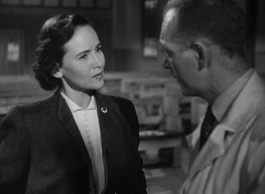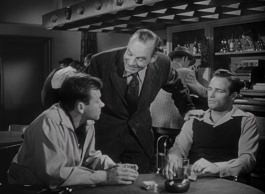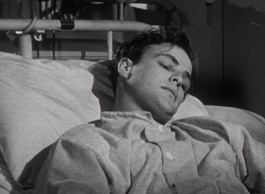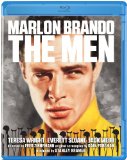| Reviews & Columns |
|
Reviews DVD TV on DVD Blu-ray 4K UHD International DVDs In Theaters Reviews by Studio Video Games Features Collector Series DVDs Easter Egg Database Interviews DVD Talk Radio Feature Articles Columns Anime Talk DVD Savant Horror DVDs The M.O.D. Squad Art House HD Talk Silent DVD
|
DVD Talk Forum |
|
|
| Resources |
|
DVD Price Search Customer Service #'s RCE Info Links |
|
Columns
|
|
|
Men, The
Olive Films // Unrated // April 30, 2013
List Price: $29.95 [Buy now and save at Amazon]
Though Marlon Brando first made his name both on stage and on the silver screen in A Streetcar Named Desire, there was a short interval between his final Broadway performance as Stanley Kowalski and the whir of 35mm cameras
in the film adaptation. Brando's first role in a feature film was instead in the largely unseen drama The Men.
There's no banter beforehand, no inspiring speeches, and no hordes of enemy soldiers in a frenzied rush towards the camera. Brando's young lieutenant is introduced silently peering around the next corner, ensuring that it's safe for the rest of his platoon to move forward. It's from the opposite direction that the shot rings out. Bud, struck in the back, collapses. From this moment forward, he will never again move his legs or feel any sensation below the waist. Whatever bright light was burning within him has been snuffed out. Bud is sent to a veteran's hospital to convalesce but, rather than adapt to his new life, prefers to wallow in misery instead. Bud does his damndest to ensure that his mind and body remain as inert as his legs. His doctor (Everett Sloane), an early specialist in paraplegia, moves Bud from his private room to a ward of similarly afflicted soldiers. Dr. Brock hopes that the presence of other paraplegic young men -- soldiers who've come to terms with their disabilities and are adjusting as best they can -- will prove to Bud that he's not resigned to life as a lump in a hospital bed. Instead, his toxic negativity threatens to poison the men around him. Two people refuse to relent, though: the unwaveringly loyal girl that Bud turned his back on years ago (Teresa Wright) and the ward's most wide-eyed optimist (Arthur Jurado). They inspire Bud to rebuild himself in the face of his new limitations, but as he soon learns, it takes more than strength and resolve to deal with life as a paraplegic in the outside world.
My initial reactions to The Men were mixed, but this is very much a film I find myself appreciating more and more as I think about it. I initially found the introduction of Bud to be a dramatic misfire. At the outset, he's a nameless, interchangeable soldier with no dialogue or anything resembling characterization to speak of. If such a character had fallen in any other movie as Bud does here, he'd be written off as cannon fodder. It's difficult to feel any sense of loss for a character we as an audience had essentially never met, and that's rendered all the more troublesome since he then vanishes for a sizeable chunk of the film. It took me a short while to realize that this is entirely the point. We're meant to know Bud as the men in the ward do. Bud defines himself purely in terms of his sour temperment and disability, and to his fellow patients and to ourselves, that's all there is to see. By preventing us from becoming acquainted with Bud in sunnier days, the tragedy isn't in what he lost but in what he refuses to reclaim, and that ultimately is far more powerful. When a smile does at long last creep across Bud's face, his newfound outlook is infectious, building to heights that are soon stripped away when his self-destructive, self-loathing tendencies once again resurface. There's an unmistakeable artifice in many of the supporting performances, and that makes Brando's more natural work here stand out that much more. Those around
him are acting; Brando simply is, and if not for a few seconds of footage of him upright and walking at the outset, I wonder if audiences in 1950 would've believed that the actor heretofore unseen outside of the stage was, in fact, paraplegic. Though Brando's performance throughout the early stretches of The Men is somewhat muted, this ensures that the joyous highs and soul-crushing lows that follow resonate that much more deeply. There's something to be said for the historical significance of The Men showcasing Brando in his first film role, but that sort of asterisk shouldn't overshadow what he as an actor has accomplished here, deftly blending youthful vulnerability with an incendiary rage.
Paraplegia perhaps wasn't something the average filmgoer would've been well-acquainted with back in 1950. Much of the first act of The Men, accordingly, is devoted to Dr. Brock essentially giving the audience a lecture on the nature of the affliction. The patients under his care are introduced as Brock updates his staff on their conditions, and that's addressed with a curious fascination with their bowel movements. Necessary though that fifteen minute exercise may have been more than sixty years ago, it's somewhat tedious to wade through these many decades later. It's not made any easier by Everett Sloan's somewhat overexaggerated performance, relishing every moment when he's the focal point of the film. His acting is far more effective when he shares the screen during Brando's more intense moments and isn't rattling off entire encyclopedia pages at a time. As for the rest of the titular men, they're an intriguing mix of personalities and acting styles. Angel aside, none of them are deep or richly compelling, but they're welcomed diversions that ably buoy the film along. Richard Erdman, still in front of the camera on Community as he approaches the age of 90, is a standout as a wise-cracking gambler. Much like the rest of the patients in the ward, he's given splashes of additional color to further elevate him from the one-note character he appears to be at first glance.
It's all but impossible to watch The Men and not draw obvious parallels to William Wyler's The Best Years of Our Lives. Both films are intimate, character-driven pieces about the debilitating aftermath of war. They both feature prominent roles by genuine military men who suffered life-changing injuries. There's some of the same uncomfortable curiosity from onlookers and difficult readjustment to the world at large. They both even star Teresa Wright as an embattled love interest. The emotions throughout The Men don't smolder with quite the same intensity as they do in The Best Years of Our Lives, however. The Men is dramatically at somewhat of a disadvantage because so much of the film is set in the hospital -- there's far less of that uncomfortable collision with the world outside as they try to cope -- and simply because of the nature of the affliction. One of the tragedies of paraplegia is that the body at a glance appears to be fine, giving false hope of a miraculous recovery that will never come. Immobile legs inherently aren't as cinematic as Harold Russell's double amputee in The Best Years of Our Lives. The sight of Russell's disability is visceral in a way that The Men could never hope to be, and this film's early exploration of paraplegia can't match the more graphic nature or deeper intensity of later works as Coming Home or Born on the Fourth of July either. Still, The Men treats its subjects with a great deal of respect, considerable effort was clearly invested in its quest for authenticity, and it doesn't diminish these men's struggles with the expected Hollywood gloss. It builds to a finalé that's ultimately hopeful but doesn't have Brando and Wright walking arm-in-arm into the sunset or anything similarly contrived.
Though The Men doesn't approach the same dizzying heights as other films that have delved into similar subject matter, it's a well-crafted work just the same and a worthy debut of one of the greatest actors to ever grace the silver screen. Recommended.
Video
It's not a world-class remaster, no, but The Men does look quite handsome on Blu-ray. Definition and fine detail are certainly both respectable. Contrast is reasonably robust, and though the filmic texture isn't as crisply rendered as I'd have liked, it hasn't been smeared away by overzealous digital noise reduction either. There is quite a bit of speckling, however, and the image is a touch softer that I would've expected. Not that this should be considered a fault specific to this Blu-ray disc, but the quality degrades significantly in shots with dissolves or other optical effects:
This high definition presentation overall rates as good but not quite great. The Men arrives on a single-layer Blu-ray disc at its theatrical aspect ratio of 1.37:1.
Audio
I suspect that I'd be hard-pressed to distinguish between The Men's 16-bit, monaural DTS-HD Master Audio soundtrack and an older DVD release. Pops and crackles persist throughout the entirety of the film. The
fidelity generally falls somewhere below average. The instrumentation in the handful of scored sequences is indistinctly muddled together, grating enough at the outset that I had to dial the volume down considerably lower than usual for it to be tolerable. Thankfully, The Men is predominantly a dialogue-driven film, so that's not a concern for the the bulk of the movie. Line readings are consistently discernable throughout, although the volume and fidelity of a couple do flutter mid-sentence. Lackluster but listenable.
There are no other audio options.
Extras
Nothing.
The Final Word
The Men is far removed from the enduring classic that a year later would define Marlon Brando's career, and it doesn't approach the heights of such films that tread similar thematic ground as The Best Years of Our Lives and Born on the Fourth of July. Despite not having aged especially well and languishing in relative obscurity for the past sixty years, The Men is still a rewarding discovery on Blu-ray. It's the first document of Brando on film, a status that cannot be ignored, and The Men treats its subject matter with the gravity and sincerity it deserves. Recommended.
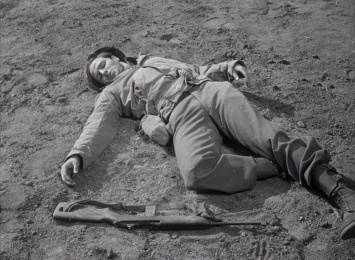 |
| [click on the thumbnail to enlarge] |
There's no banter beforehand, no inspiring speeches, and no hordes of enemy soldiers in a frenzied rush towards the camera. Brando's young lieutenant is introduced silently peering around the next corner, ensuring that it's safe for the rest of his platoon to move forward. It's from the opposite direction that the shot rings out. Bud, struck in the back, collapses. From this moment forward, he will never again move his legs or feel any sensation below the waist. Whatever bright light was burning within him has been snuffed out. Bud is sent to a veteran's hospital to convalesce but, rather than adapt to his new life, prefers to wallow in misery instead. Bud does his damndest to ensure that his mind and body remain as inert as his legs. His doctor (Everett Sloane), an early specialist in paraplegia, moves Bud from his private room to a ward of similarly afflicted soldiers. Dr. Brock hopes that the presence of other paraplegic young men -- soldiers who've come to terms with their disabilities and are adjusting as best they can -- will prove to Bud that he's not resigned to life as a lump in a hospital bed. Instead, his toxic negativity threatens to poison the men around him. Two people refuse to relent, though: the unwaveringly loyal girl that Bud turned his back on years ago (Teresa Wright) and the ward's most wide-eyed optimist (Arthur Jurado). They inspire Bud to rebuild himself in the face of his new limitations, but as he soon learns, it takes more than strength and resolve to deal with life as a paraplegic in the outside world.
My initial reactions to The Men were mixed, but this is very much a film I find myself appreciating more and more as I think about it. I initially found the introduction of Bud to be a dramatic misfire. At the outset, he's a nameless, interchangeable soldier with no dialogue or anything resembling characterization to speak of. If such a character had fallen in any other movie as Bud does here, he'd be written off as cannon fodder. It's difficult to feel any sense of loss for a character we as an audience had essentially never met, and that's rendered all the more troublesome since he then vanishes for a sizeable chunk of the film. It took me a short while to realize that this is entirely the point. We're meant to know Bud as the men in the ward do. Bud defines himself purely in terms of his sour temperment and disability, and to his fellow patients and to ourselves, that's all there is to see. By preventing us from becoming acquainted with Bud in sunnier days, the tragedy isn't in what he lost but in what he refuses to reclaim, and that ultimately is far more powerful. When a smile does at long last creep across Bud's face, his newfound outlook is infectious, building to heights that are soon stripped away when his self-destructive, self-loathing tendencies once again resurface. There's an unmistakeable artifice in many of the supporting performances, and that makes Brando's more natural work here stand out that much more. Those around
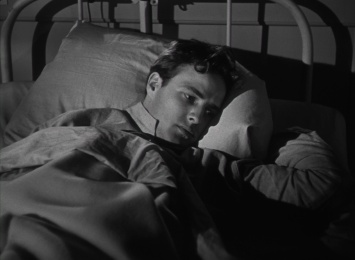 |
| [click on the thumbnail to enlarge] |
Paraplegia perhaps wasn't something the average filmgoer would've been well-acquainted with back in 1950. Much of the first act of The Men, accordingly, is devoted to Dr. Brock essentially giving the audience a lecture on the nature of the affliction. The patients under his care are introduced as Brock updates his staff on their conditions, and that's addressed with a curious fascination with their bowel movements. Necessary though that fifteen minute exercise may have been more than sixty years ago, it's somewhat tedious to wade through these many decades later. It's not made any easier by Everett Sloan's somewhat overexaggerated performance, relishing every moment when he's the focal point of the film. His acting is far more effective when he shares the screen during Brando's more intense moments and isn't rattling off entire encyclopedia pages at a time. As for the rest of the titular men, they're an intriguing mix of personalities and acting styles. Angel aside, none of them are deep or richly compelling, but they're welcomed diversions that ably buoy the film along. Richard Erdman, still in front of the camera on Community as he approaches the age of 90, is a standout as a wise-cracking gambler. Much like the rest of the patients in the ward, he's given splashes of additional color to further elevate him from the one-note character he appears to be at first glance.
It's all but impossible to watch The Men and not draw obvious parallels to William Wyler's The Best Years of Our Lives. Both films are intimate, character-driven pieces about the debilitating aftermath of war. They both feature prominent roles by genuine military men who suffered life-changing injuries. There's some of the same uncomfortable curiosity from onlookers and difficult readjustment to the world at large. They both even star Teresa Wright as an embattled love interest. The emotions throughout The Men don't smolder with quite the same intensity as they do in The Best Years of Our Lives, however. The Men is dramatically at somewhat of a disadvantage because so much of the film is set in the hospital -- there's far less of that uncomfortable collision with the world outside as they try to cope -- and simply because of the nature of the affliction. One of the tragedies of paraplegia is that the body at a glance appears to be fine, giving false hope of a miraculous recovery that will never come. Immobile legs inherently aren't as cinematic as Harold Russell's double amputee in The Best Years of Our Lives. The sight of Russell's disability is visceral in a way that The Men could never hope to be, and this film's early exploration of paraplegia can't match the more graphic nature or deeper intensity of later works as Coming Home or Born on the Fourth of July either. Still, The Men treats its subjects with a great deal of respect, considerable effort was clearly invested in its quest for authenticity, and it doesn't diminish these men's struggles with the expected Hollywood gloss. It builds to a finalé that's ultimately hopeful but doesn't have Brando and Wright walking arm-in-arm into the sunset or anything similarly contrived.
Though The Men doesn't approach the same dizzying heights as other films that have delved into similar subject matter, it's a well-crafted work just the same and a worthy debut of one of the greatest actors to ever grace the silver screen. Recommended.
Video
It's not a world-class remaster, no, but The Men does look quite handsome on Blu-ray. Definition and fine detail are certainly both respectable. Contrast is reasonably robust, and though the filmic texture isn't as crisply rendered as I'd have liked, it hasn't been smeared away by overzealous digital noise reduction either. There is quite a bit of speckling, however, and the image is a touch softer that I would've expected. Not that this should be considered a fault specific to this Blu-ray disc, but the quality degrades significantly in shots with dissolves or other optical effects:
This high definition presentation overall rates as good but not quite great. The Men arrives on a single-layer Blu-ray disc at its theatrical aspect ratio of 1.37:1.
Audio
I suspect that I'd be hard-pressed to distinguish between The Men's 16-bit, monaural DTS-HD Master Audio soundtrack and an older DVD release. Pops and crackles persist throughout the entirety of the film. The
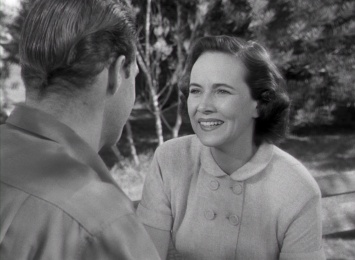 |
| [click on the thumbnail to enlarge] |
There are no other audio options.
Extras
Nothing.
The Final Word
The Men is far removed from the enduring classic that a year later would define Marlon Brando's career, and it doesn't approach the heights of such films that tread similar thematic ground as The Best Years of Our Lives and Born on the Fourth of July. Despite not having aged especially well and languishing in relative obscurity for the past sixty years, The Men is still a rewarding discovery on Blu-ray. It's the first document of Brando on film, a status that cannot be ignored, and The Men treats its subject matter with the gravity and sincerity it deserves. Recommended.
|
| Popular Reviews |
| Sponsored Links |
|
|
| Sponsored Links |
|
|
| Release List | Reviews | Shop | Newsletter | Forum | DVD Giveaways | Blu-Ray | Advertise |
|
Copyright 2024 DVDTalk.com All Rights Reserved. Legal Info, Privacy Policy, Terms of Use,
Manage Preferences,
Your Privacy Choices | |||||||









